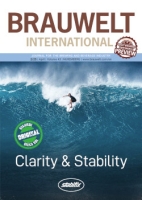The various possibilities available for filtering beer were one of the major items on the agenda in Bad Kreuznach. In this contribution, Brauwelt author Dr. Günther Arndt summarizes the different approaches and content of the lectures on the subject of this process step, a subject that continues to be of current interest.
Suitable analytical monitoring methods for assessment of important technological processes are described in a three-part publication. The core messages from a lecture delivered by Univ.-Prof. Dr.-Ing. Werner Back at the 39th Technological Seminar 2006 are outlined. Part 1 (Brauwelt International No. 3 (2007), p. 162) covered the issues of malt quality and mashing as well as wort boiling. This Part 2 deals with the topics of fermentation, yeast technology, filterability and haze problems.
Despite claims to the contrary, most breweries are still not “kieselguhr-free”. The majority of breweries in Germany and internationally, continue to use kieselguhr as a filter aid. In spite of this, or perhaps because of it, kieselguhr remains a subject of contention. To say that questions about disposal methods, which are best and which are legal, make for lively conversation, is an understatement. Therefore, methods currently available for disposal and recycling of kieselguhr sludge will be examined below.
Barm beer can be recovered from excess yeast by means of suitable recovery systems. These include, in the main, centrifuge processes (decanters and disc centrifuges) and membrane separation techniques (cross-flow and vibration microfiltration) ([1], [2]). A multiplicity of parameters are used in order to evaluate whether barm beer can be returned to the brewing process or, indeed, if a recovery system is suitable in the first place. This contribution provides a general overview.
Even today conventional test methods still take three to five days. For this the quick detection method FastScan® only recently developed by the Scanbec GmbH (limited liability Company) in Halle, Germany, poses a real alternative. Already after two hours (after precultivation of 24 hrs) a reliable result can be achieved by this method.
The Combined Stabilisation System (CSS) is designed to improve the physical stability of beer through the adsorption of both haze forming proteins and polyphenols by the polysaccharide agarose. In 2005, Lion Nathan commissioned the first large scale CSS unit in the Tooheys Brewery, Sydney. The subsequent trials proved that the CSS has the ability to improve the physical stability of beer within the operational requirements of a large commercial brewery. Physical stabilisation by the CSS appears to occur by the selective adsorption of haze forming polyphenols, in particular prodelphinidin B3, and haze sensitive proteins whilst maintaining foam quality.
Extensive discussions about kieselguhr-free filtration techniques during the past EBC-Congress in Prague showed, that membrane filtration systems became a serious competitor to kieselguhr filtration systems. In 2004, NORIT has developed a new Beer Membrane Filter (BMF), Type BMF-200. An operating expense analysis of this new beer membrane filter type was done at Oettinger Brewery in Oettingen/Germany, where this new filter type is in use for over eight months now.
The crossflow-microfiltration plant in the Oettinger Brewery was developed as a single-step beer clarification system without a separation step (see Fig. 1). Unfiltered beer is delivered to the cylindro-conical unfiltered beer buffer tank, while blending PVPP and Hydrogel.e. ...
In recent years, kieselguhr filters had to comply with more stringent requirements both in terms of better performance and also in terms of filtrate quality. The Innopro Getra Eco kieselguhr candle filter, a new development from KHS, has everything it takes to fully meet both criteria.
In this paper, the Innopro Getra Eco filter will be described in more detail, taking a filter plant as an example that has been in operation, without any complaints whatsoever, for several years in Obolon Brewery in Kiev/Ukraine.
As of January 2002, the Innopro Getra Eco has filtered more than 10 million hl of beer at Obolon. The brewery wanting to produce a bright beer was more than satisfied with the result. Average haze is below 0.4 EBC (Sigrist 90°), a value of far below 0. ...
On the occasion of its 20th anniversary, Gernep GmbH will provide a comprehensive overview of its product line. Labelling machines for wet glue labelling, a combination of wet glue and self-adhesive labelling as well as wrap-around labelling will be exhibited. The "Labetta" series label-ling machines offer almost unlimited decoration possibilities due to flexible arrangement features. Retrofitting to suit new bottle and label formats is unproblematic and cost-effective thanks to the rotating guide element divided into segments. Individual options such as L or U-shaped neck applications and band-shaped labels can be set up easily and combined with standard body, shoulder and back labels without the slightest problem.
Filtrox, one of the leading specialists for equipment and filter sheets for beverage filtration, with more than 1500 installed filter lines worldwide, presents itself at drinktec under the motto "We care", thus fully responding to the trend of our times where, due to limited funds for new investments, existing plants continue in operation while being optimised and modernised. ..
Alfa Laval will emphasise the importance of kieselguhr-free beer filtration based on the cross-flow process. Apart from cross-flow filtration, the company will also present sterile and trap filtration systems as well as technologies for producing beer with a low alcoholic content and a system for beer recovery from excess yeast. Both systems use membrane technology.
The new Foodec series decanter centrifuges have been specifically developed for the brewing and beverage industry, particularly for recovery of wort and beer, as well as for dewatering spent beer grains and brandhefe. In wine production, they are used for must clarification and wine recovery from yeast sediments. Yield, quality and protection from external influences (oxidation) are important factors in these processes. ...


